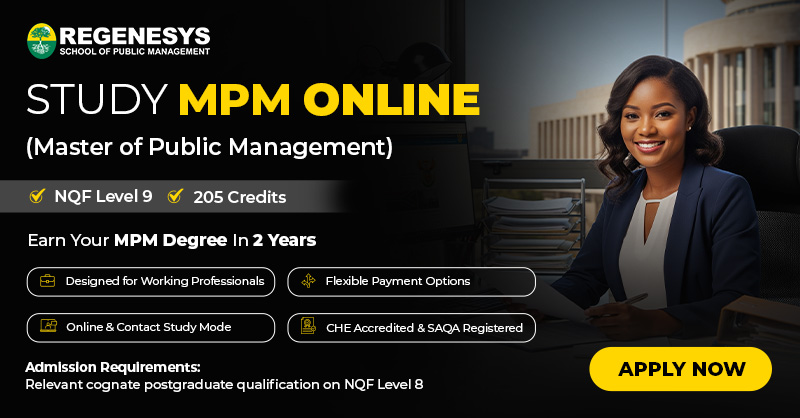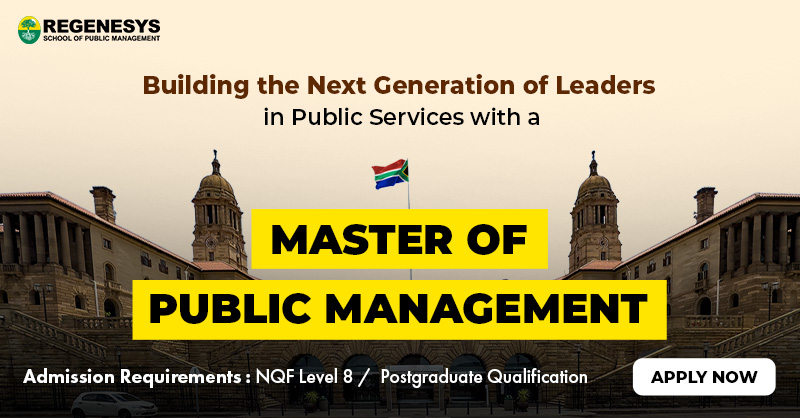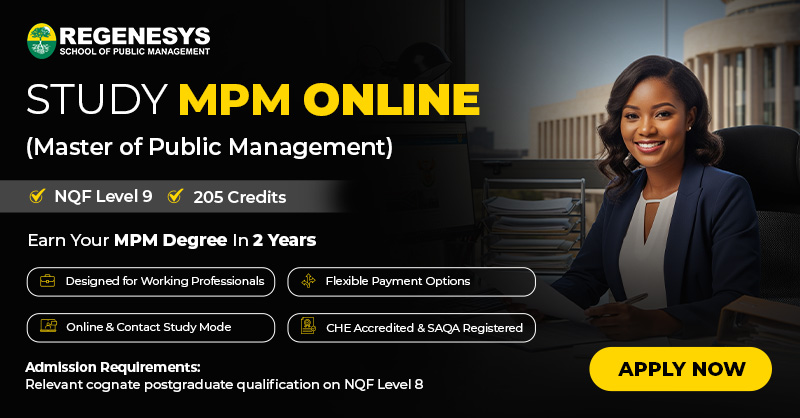South Africa’s public sector demands skilled leaders who can address complex governance challenges, implement sustainable policies, and ensure effective service delivery. A Master of Public Management (MPM) equips professionals with advanced capabilities to tackle these issues. However, completing the qualification is just the beginning. The real challenge lies in building a structured pathway that transforms academic knowledge into career growth. Post-MPM career planning is crucial for professionals aiming to rise to director-level or executive positions.
In this article, we will understand post-MPM career planning in SA, including SMART planning, networking strategies, mentorship, and further education opportunities to ensure maximum growth.
Table of Contents
- SMART Goals for Public Sector Career Strategy
- Mapping Skills to Roles: Building Your MPM Graduate Roadmap in SA
- Networking Strategies for Strategic Growth in Government
- Tracking Milestones: How to Plan a Career After MPM?
- Mentorship Post-MPM: Learning from Senior Leaders
- CPD & Further Education: Sustaining Growth Beyond the MPM
- Conclusion
- Post-MPM career planning in SA – FAQ
SMART Goals for Public Sector Career Strategy
One of the most practical approaches to post-MPM career planning in SA is the SMART framework: Specific, Measurable, Achievable, Relevant, and Time-bound. This structured system transforms vague ambitions into actionable steps.
For public-sector professionals, career goals must align with national priorities such as improved service delivery, digital transformation, and fiscal accountability. For instance, instead of aiming vaguely to “get promoted,” a SMART goal might be: “Secure a Deputy Director role in the Department of Health within 24 months by leading two cross-departmental projects and completing an MPM.”
Practical applications of goal setting that MPM graduates can use:
- Specific: Target a defined position such as Chief Director or Programme Manager.
- Measurable: Set quantifiable benchmarks like completing 40 hours of CPD per year.
- Achievable: Use complementary qualifications such as Regenesys’ MPM to ensure readiness.
- Relevant: Align with departmental priorities, e.g., modernising service delivery.
- Time-bound: Attach timelines, such as achieving milestones within 12–24 months.
By embedding SMART planning into a public sector career strategy, graduates build accountability into their growth path.

Mapping Skills to Roles: Building Your MPM Graduate Roadmap in SA
A crucial stage in post-MPM career planning in SA is connecting your skills to specific public-sector roles. Many MPM graduates underestimate the transferability of their competencies, especially when complemented by broader knowledge from programmes such as the Regenesys Master of Public Management (MPM).
Begin with a skills audit. Identify the capabilities developed through your MPM:
- Policy analysis and development
- Strategic leadership
- Public finance management
- Ethics and governance
- Stakeholder engagement
Once your skills are clear, align them with roles currently in demand across government departments and public entities. The table below illustrates how your MPM skills, when enhanced with MPM training, can open targeted career opportunities:
|
Skills Developed through MPM |
Potential Public-Sector Role |
Value of Adding MPM Skills |
|
Policy analysis and governance |
Policy Analyst, Programme Adviser |
Adds financial and operational insight to analysis |
|
Leadership and ethics |
Deputy Director, Department Head |
Strengthens organisational leadership and decision-making |
|
Public finance |
Budget Analyst, CFO in SOEs |
Enhances corporate governance and fiscal oversight |
|
Project management |
Programme Manager, Operations Lead |
Builds advanced management and execution capabilities |
This approach creates a structured MPM graduate roadmap SA, allowing you to clearly identify which roles match your existing skills and where further education, such as the MPM, can bridge gaps. By mapping competencies to opportunities, you make your post-MPM career planning in SA both strategic and actionable.
Read more on Understanding the Significance of a Master of Public Management (MPM) here
Networking Strategies for Strategic Growth in Government
In the context of post-MPM career planning in SA, networking is more than social interaction; it is a deliberate, structured approach to building a long-term career in public service.
Networking in public-sector spaces supports both professional growth and the broader goal of strengthening governance systems. It provides access to mentorship, peer learning, and insider knowledge about evolving policy frameworks and institutional reforms. Importantly, it helps professionals position themselves as credible contributors to government innovation and strategic transformation.
Practical Networking Strategies for Post-MPM Career Growth in SA
Public-sector professionals engaged in post-MPM career planning in SA can adopt the following strategies:
Join Professional Associations
Organisations like the South African Association of Public Administration and Management (SAAPAM) provide valuable platforms for networking, thought leadership, and research dissemination. Active participation in such bodies demonstrates commitment to the public management profession.
Attend Sector-Specific Events
Parliamentary committee hearings, government conferences, and public service summits are excellent opportunities to engage with decision-makers, understand national priorities, and build visibility within policy circles.
Tap into the Regenesys Alumni Network
Regenesys School of Public Management offers an extensive network of graduates in both government and business. Alumni connections often translate into collaborative projects, leadership recommendations, and opportunities for career mobility.
Engage in Digital Communities
Online forums, policy think-tanks, and LinkedIn groups dedicated to governance and public administration provide a modern way to connect with like-minded professionals, share expertise, and stay updated on governance challenges in South Africa.
Why Networking Matters in Post-MPM Career Planning
Strategic networking ensures professionals remain informed about:
- Policy shifts and upcoming legislative priorities.
- Vacancies in senior public service roles.
- Opportunities for interdepartmental or cross-sector collaboration.
- Thought leadership spaces where professionals can contribute articles, research, or presentations.
For individuals focused on post-MPM career planning in SA, networking not only improves career prospects but also builds credibility as proactive leaders committed to South Africa’s governance future. Regenesys, with its strong academic foundation and professional ecosystem, offers a natural hub for developing these critical connections.
Read more on Navigating the Challenges of Public Management: Insights from MPM Graduates here

Tracking Milestones: How to Plan a Career After MPM?
Setting goals is important, but without tracking progress, even the best plans can lose momentum. For effective post-MPM career planning in SA, milestone tracking helps graduates stay accountable, measure achievements, and adjust strategies in line with changing opportunities in the public sector.
Milestone tracking ensures that post-MPM career planning in SA remains both structured and adaptable. It provides graduates with a clear roadmap to balance academic demands with professional growth, ensuring that when the degree is complete, they are positioned to transition seamlessly into senior leadership roles within government, NGOs, or international organisations.
Sample Career Development Timeline
Year 1 (During MPM Coursework):
- Build strong academic foundations by excelling in modules such as governance, strategy, and financial management.
- Begin publishing thought pieces or policy articles to establish professional visibility.
- Attend at least two conferences, workshops, or summits to expand networks while studying.
Year 2 (Dissertation Year):
- Align your dissertation with a policy area or governance challenge that is relevant to your career goals.
- Use the research process to engage with government departments, NGOs, or think-tanks, building connections beyond academia.
- Present early research findings at seminars or policy forums to position yourself as a subject expert.
Post-MPM (Graduation and Beyond)
- Apply for senior management or specialist policy roles.
- Take on interdepartmental leadership projects or advisory positions.
- Pursue executive short courses for continued professional development.
- Mentor junior colleagues or interns, contributing to public-sector capacity building.
Steps for Tracking Career Milestones
- Conduct Quarterly Reviews – Track progress against academic, research, and professional goals.
- Seek Feedback – Regularly consult mentors, supervisors, or managers for constructive guidance.
- Adapt to Shifts – Stay agile when external factors such as government priorities, policy reforms, or budget cycles require timeline adjustments.
Read more on How Accreditation Affects the Recognition of Your Master of Public Management (MPM) Degree? here
Mentorship Post-MPM: Learning from Senior Leaders
Mentorship is one of the most powerful tools for career development, offering lessons and perspectives that cannot be found in textbooks alone. For graduates engaged in post-MPM career planning in SA, guidance from experienced leaders provides direction in navigating complex government structures, shaping policy influence, and practising ethical leadership.
Senior mentors serve not only as advisors but also as role models, demonstrating how theory translates into effective governance. They help graduates recognise both opportunities and pitfalls in public-sector leadership, accelerating the transition from academic achievement to meaningful impact in government.
Where to Find Mentors?
- Within Government Departments: Senior managers, directors, and deputy directors-general are often open to mentoring ambitious professionals who demonstrate initiative.
- Professional Associations and Think Tanks: Organisations such as the South African Association of Public Administration and Management (SAAPAM) and policy research institutions offer structured platforms to connect with thought leaders.
- Academic Circles: Regenesys faculty, many of whom blend research expertise with practical governance experience, can guide graduates on both intellectual growth and career alignment.
- Alumni Networks: Regenesys’ alumni network connects graduates with senior professionals across government, NGOs, and international organisations who understand the challenges of public service leadership.
Benefits of Mentorship for MPM Graduates
Engaging with mentors as part of post-MPM career planning in SA offers significant advantages, including:
- Career Navigation: Practical advice on progressing within hierarchical government systems and understanding institutional dynamics.
- Collaboration Opportunities: Mentors often introduce graduates to projects, task teams, or advisory boards, creating platforms for visibility.
- Strategic Alignment: Guidance on aligning personal career goals with South Africa’s national development priorities, ensuring professional growth contributes to the public good.
- Ethical Leadership Development: Learning to balance authority with accountability, integrity, and fairness—qualities essential in governance.
Read more on Career Prospects for Graduates of Master of Public Management (MPM) in South Africa here
CPD & Further Education: Sustaining Growth Beyond the MPM
Completing a Master of Public Management (MPM) is a significant milestone, but a qualification on its own cannot guarantee sustained career growth. In today’s fast-changing governance environment, where policies, technologies, and public expectations evolve rapidly, Continuous Professional Development (CPD) is vital for staying relevant and competitive. For professionals engaged in post-MPM career planning in SA, CPD represents an ongoing investment in learning that supports both personal advancement and national development.
Why CPD Matters After the MPM
- Adaptability: Public-sector leaders must keep pace with emerging policy priorities, technological innovations, and shifts in governance practices.
- Professional Credibility: Ongoing education signals commitment to excellence, positioning professionals as forward-thinking leaders.
- Career Progression: Many director-level and executive roles require evidence of CPD or further academic preparation beyond a master’s degree.
Read more on Importance of Public Management in South Africa: Pathways to Public Sector Transformation here

Conclusion
South Africa’s public sector is evolving, with increasing demand for leaders who can shape policy, drive reform, and ensure sustainable service delivery. Completing a Master of Public Management (MPM) provides a strong foundation, but true career success comes from strategic planning after graduation. By applying SMART goals, mapping skills to roles, building professional networks, seeking mentorship, and committing to CPD, graduates can create a clear and achievable roadmap toward director-level or executive leadership.
For professionals serious about advancing in government or public service, post-MPM career planning in SA is the bridge between academic achievement and impactful leadership.
Take the next step with Regenesys School of Public Management. Visit the Regenesys website today to enrol for the upcoming October intake!
Post-MPM career planning in SA – FAQ
Why is post-MPM career planning in SA important?
Because the MPM degree provides theoretical and practical knowledge but structured planning ensures graduates can translate learning into promotions, leadership roles, and policy influence.
How should I track milestones after completing my MPM?
Professionals can track milestones by conducting quarterly reviews, seeking mentor feedback, and adjusting timelines to reflect changing government priorities or budget cycles.
How do SMART goals help with career planning after MPM?
SMART goals make ambitions actionable by setting clear, measurable, and time-bound objectives aligned with government priorities.
Is networking really necessary in the public sector?
Yes. Networking helps professionals stay informed about policy shifts, vacancies, and collaborative opportunities while building visibility as proactive leaders.
How can mentorship support MPM graduates?
Mentors provide career guidance, open doors to projects and advisory boards, and model ethical leadership practices essential for governance.
What is the role of CPD in post-MPM career growth?
CPD ensures professionals remain relevant by updating their skills in areas such as finance, ethics, and digital transformation—critical for director-level roles.







